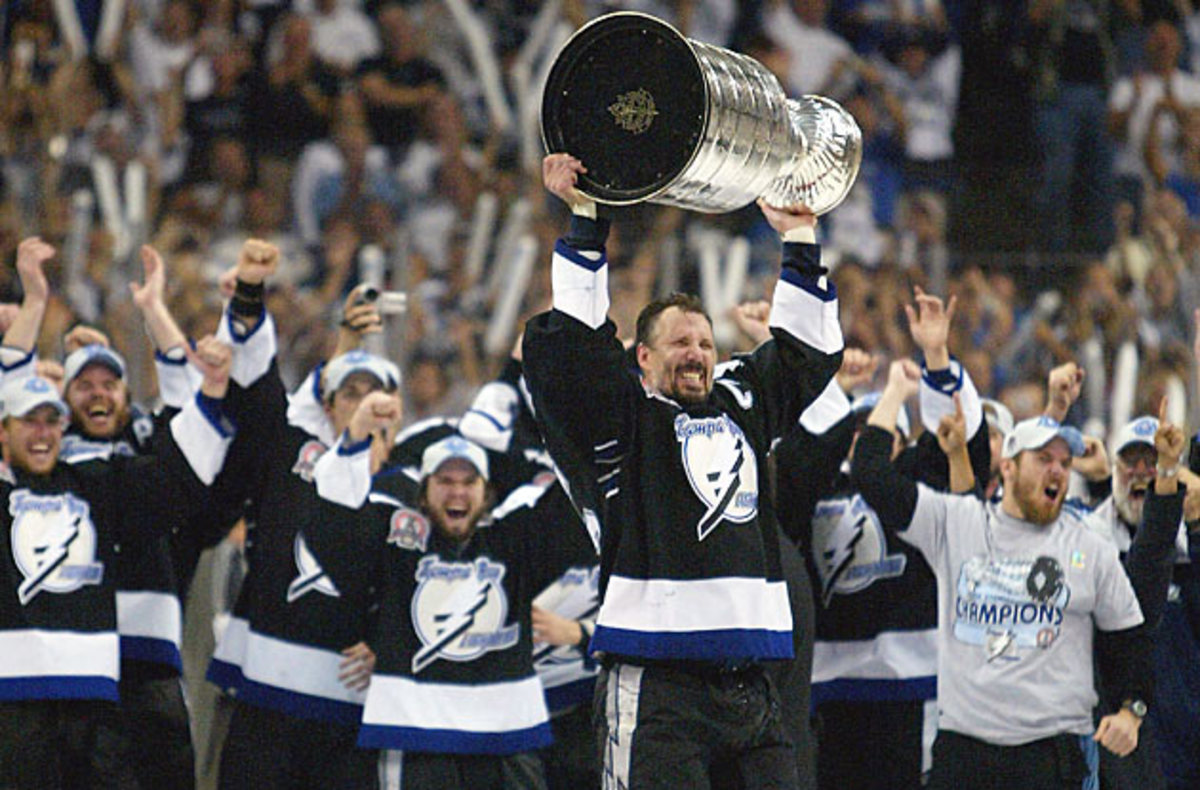SI Vault: Lightning strikes twice to win first Stanley Cup

This story originally appeared in the June 14, 2004, issue of Sports Illustrated. Subscribe to the magazine here.
Posters and T-shirts proclaiming STANLEY NEEDS A TAN were everywhere in Tampa during the playoffs, but until Martin St. Louis’s goal 33 seconds into the second overtime of Game 6 lastSaturday, it seemed the hometown Lightning would be the ones who emerged from the Stanley Cup finals looking red-faced. After& being outworked and outplayed in four of the first fivegames—and falling behind the Calgary Flames three games to two—Tampa Bay engineered a stunning comeback, putting together its first back-to-back victories in more than a month and winning its first championship with a 2–1 triumph in Game 7 on Monday night.
Lord Stanley’s chalice is North America’s oldest professional trophy, but this year’s final belonged to the NHL’s youngest generation. Tampa Bay, which joined the league in 1992, had wonjust one playoff series before this season and is the first of the eight franchises added since ’91 to win the Cup. The series also amounted to a debutant ball for 24-year-old Lightning center Brad Richards, the Conn Smythe Trophy winner and the playoffs’ leading scorer with 26 points.
My Town, My Team: Tampa Bay Lightning fan is nuts about Bolts
Richards had an assist on Monday, but the deciding game belonged to another newly minted, rosy-cheeked playoff hero. Right wing Ruslan Fedotenko, 25, who sat out Game 4 after being ridden face-first into the boards late in Game 3, scored on the power play midway through the first period to give the Lightning a 1–0 lead. It was a critical goal in a series in which the team that scored first won each game, but it was the Ukrainian’s strike late in the second—a blistering shot off a brilliant feed from Vincent Lecavalier—that proved to be the Cup winner. With Calgary pressing frantically after center Craig Conroy’s goal midway through the third, Lightning goaltender Nikolai Khabibulin made a series of Cup-worthy stops, ensuring Fedotenko of his third game-winning goal of the playoffs, second to Richards’s NHL-record seven.
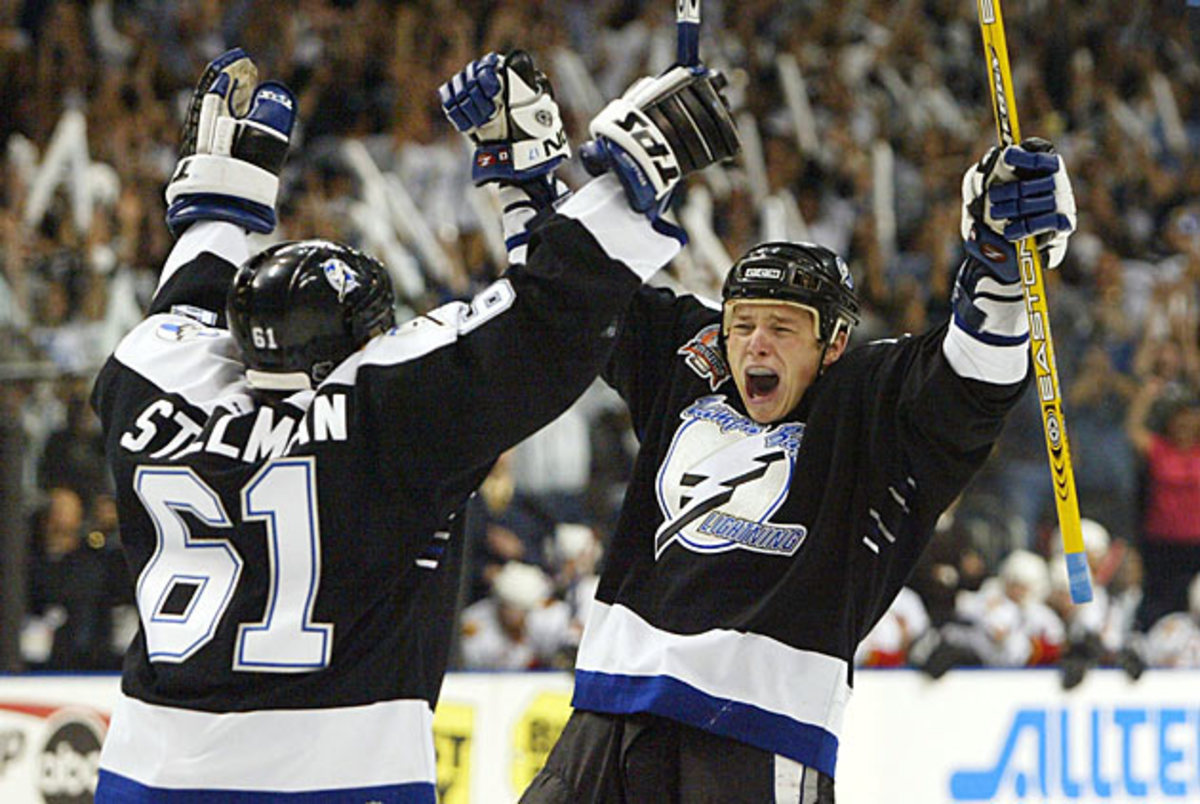
• How the 2014 Lightning were built | Cup finals preview | Schedule
If the upstart Flames had no business being in the Cup finals—the league’s 12th playoff seed, they were the first team to get there by beating three division winners—Tampa Bay often looked as if it had no business winning them, especially after Game 5. (Only four of 18 teams that had lost the fifth game of a deadlocked finals had come back to win the series.) Before his 16-save effort in the clincher, Khabibulin (1.71 goals-against average in the playoffs) was off his sparkling form of the early postseason, too often leaving rebounds lying around his crease.
And despite coach John Tortorella’s frequent and cliched reminders that the Lightning’s best players needed to be its best players, top-line standouts St. Louis and Lecavalier (combined nine points in the finals) were largely somnambulant—at least until St. Louis pounced on a rebound and sneaked the puck past Calgary goalie Miikka Kiprusoff to finally end Game 6.
On the eve of the finals St. Louis had joked that for hockey to become a religion in Tampa the locals would have to “watch less wrestling.” Early in the series it was difficult to tell the difference between the two sports, and not only because Hulk Hogan revved up the crowd before games at the St. Pete Times Forum and his daughter, Brooke, sang the Canadian and U.S. national anthems. Games 1 through 4 were ugly and penalty filled. And while the Lightning had the band Cheap Trick entertaining fans outside the Forum, the Flames countered with cheap shots. The worst of them came late in Game 4 when Calgary pest Ville Nieminen came in with his elbow high and slammed Lecavalier face-first into the glass.
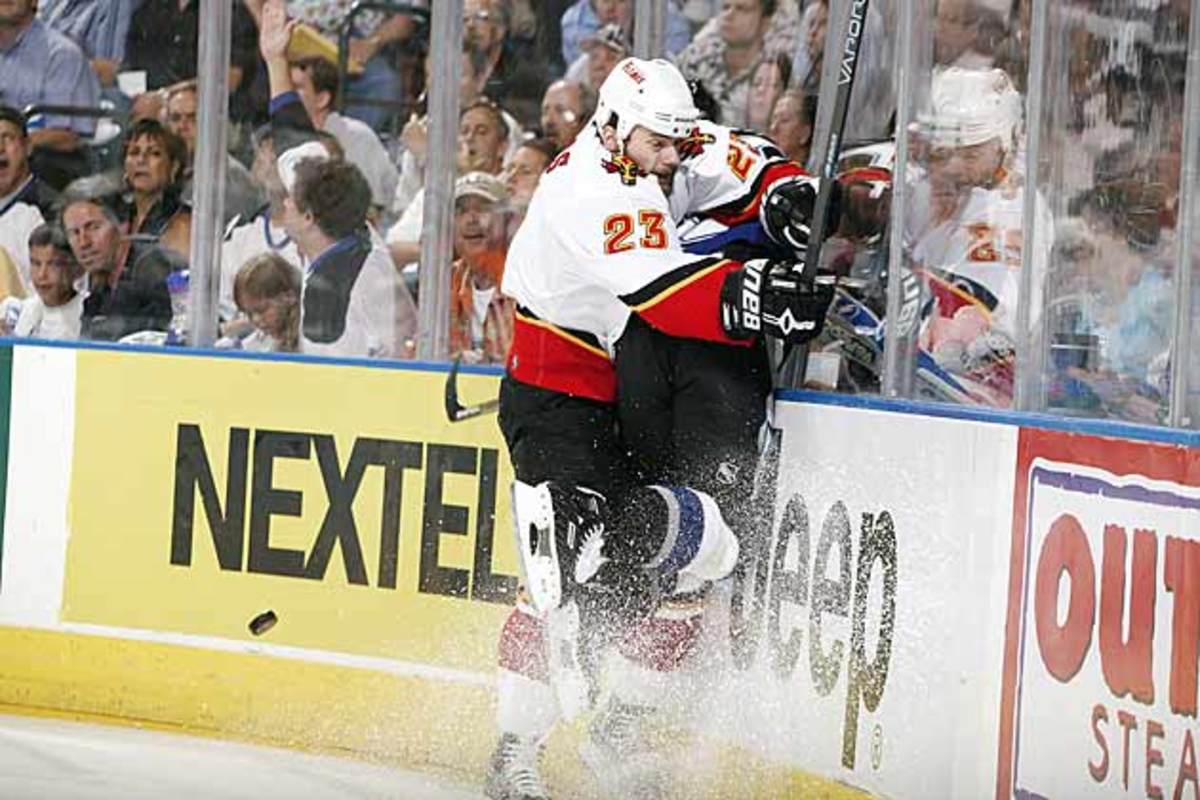
SI Vault: Expansion Lightning shock with hot start as NHL comes to Tampa
The play had repercussions beyond its apparent impact on Lecavalier, who played listlessly the rest of the series. Nieminen was suspended for Game 5, a punishment that had Flames coach Darryl Sutter looking for grassy knolls. He accused the league office of conspiring against his plucky team. “We know what we’re up against,” Sutter said at a press conference. “We’re the little team that wasn‘t supposed to be here, and a lot of people don’t want us to be here and [want] to make sure that we’re not successful.” NHL commissioner Gary Bettman called the comments “ill-advised, inappropriate, inaccurate,” and they were also ludicrous. After all, a league intent on rigging the finals would have made sure two of its most-anonymous teams weren’t part of it. While Canadians rallied around their Flames—Game 6, which drew 4.7 million viewers, was the most watched hockey broadcast on CBC in 10 years—the series fell flatter than Gigli in the U.S. Games 3 through 5 on ABC drew an average rating of less than 2.1, the lowest for a Cup finals on network TV.
Those who did watch saw three thrilling games to close out the series. In Game 5 last Thursday night the teams alternated scoring chances like boxers trading jabs. Oleg Saprykin's goal 14:40 into overtime—set up by a superhuman end-to-end effort by Calgary captain Jarome Iginla—gave the Flames a 3–2 win that putthem on the cusp of their first Cup in 15 years.
When the Lightning arrived in Calgary the next day, Tortorella announced that his team would stay in Alberta after Saturday’s Game 6 rather than charter home on a red-eye. “We will be having breakfast here with you on Sunday,” Tortorella told reporters, adding that he had designed the itinerary so his players could get some needed rest. The scheduling announcement by Tortorella, who otherwise was loath to reveal anything more than final scores to the media, sounded suspiciously like a guarantee that there would be a Game 7.
In fact, the Tampa Bay players’ spirits had been lifted after they’d flown in near silence to Calgary. Upon landing, center Tim Taylor found a surprise message on his cellphone from retired defenseman Ray Bourque, a former Boston Bruins teammate and future Hall of Famer. Bourque won the Cup in 2001 with the Colorado Avalanche, the most recent team to climb out of a 3-2 series hole, and he was calling to help spark the Lightning before Game 6. Taylor borrowed a tape recorder from the Tampa Bay p.r. staff and played Bourque’s message for his teammates in the dressing room after their Friday practice at the Saddledome.
“He said not to give up, and he told us what to do and what not to do in the next game,” Taylor said after Game 6. “It’s almost like he was coaching us.”
Bourque’s words may have been most resonant for 40-year-old captain Dave Andreychuk, who, as the active player who had played in the most games without winning a Cup, was in the same position Bourque had been in ‘01. But the message also stirred Tampa Bay’s young Canadian players, who had grown up watching Bourque. Said Richards after Game 6, “Hearing that message sent chills down my body.’
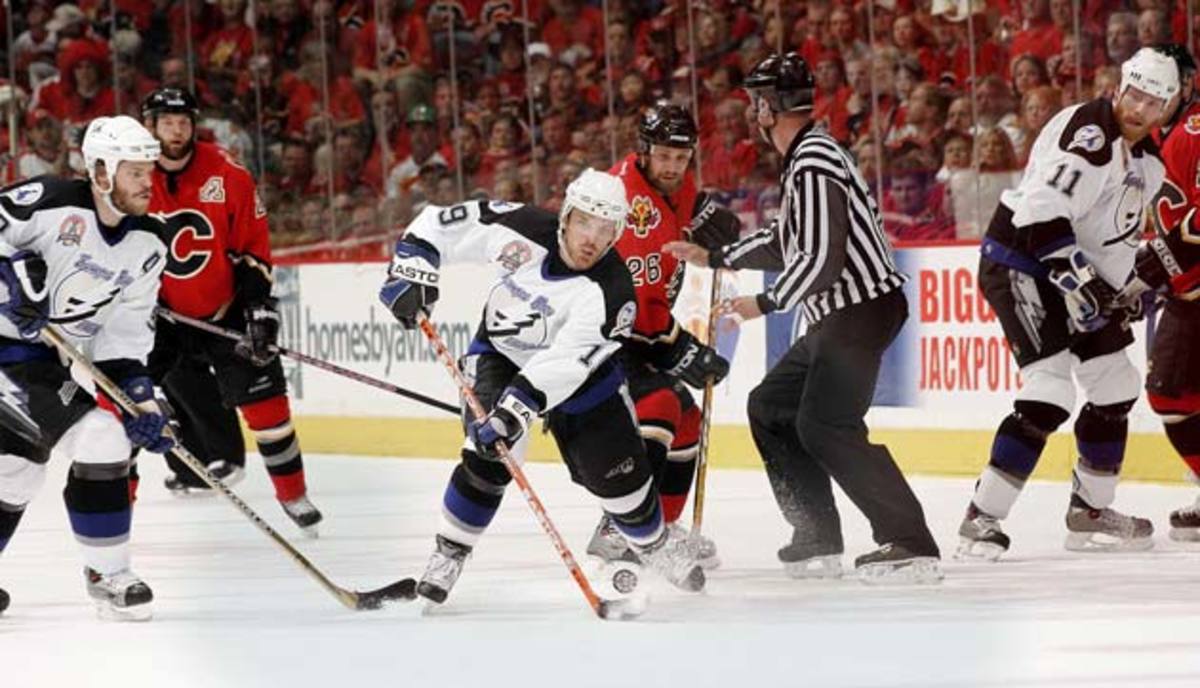
Richards was a spine-tingling presence throughout the series, capping a dramatic postseason with a finals in which he was by far the Lightning’s best skater. Tampa Bay finished the season undefeated (31-0-2) in games in which Richards scored, and his heroics in Game 6 were about all that saved the Lightning. He had two power-play goals in the second period, then assisted on the game-winner. Richards has been a topflight scorer since his days in junior hockey, but his second goal was the result of the edge he has brought to his game this season. After the puck emerged from a scrum along the boards in the Calgary zone, Richards stripped Flames forward Marcus Nilson and sent a shot whistling through Kiprusoff’s five hole. “When I didn’t play well in [last year’s] playoffs it was because I didn’t want the puck,” says Richards, who went goal-less in 11 postseason games last spring. “I want the puck more now and want to get through some of the things that are tougher than in the regular season.”
“He’s a young, up-and-coming star,” says Tampa Bay winger Chris Dingman, who was also one of Bourque’s teammates on the 2001 Avalanche. “And this is where guys make a name for themselves.”
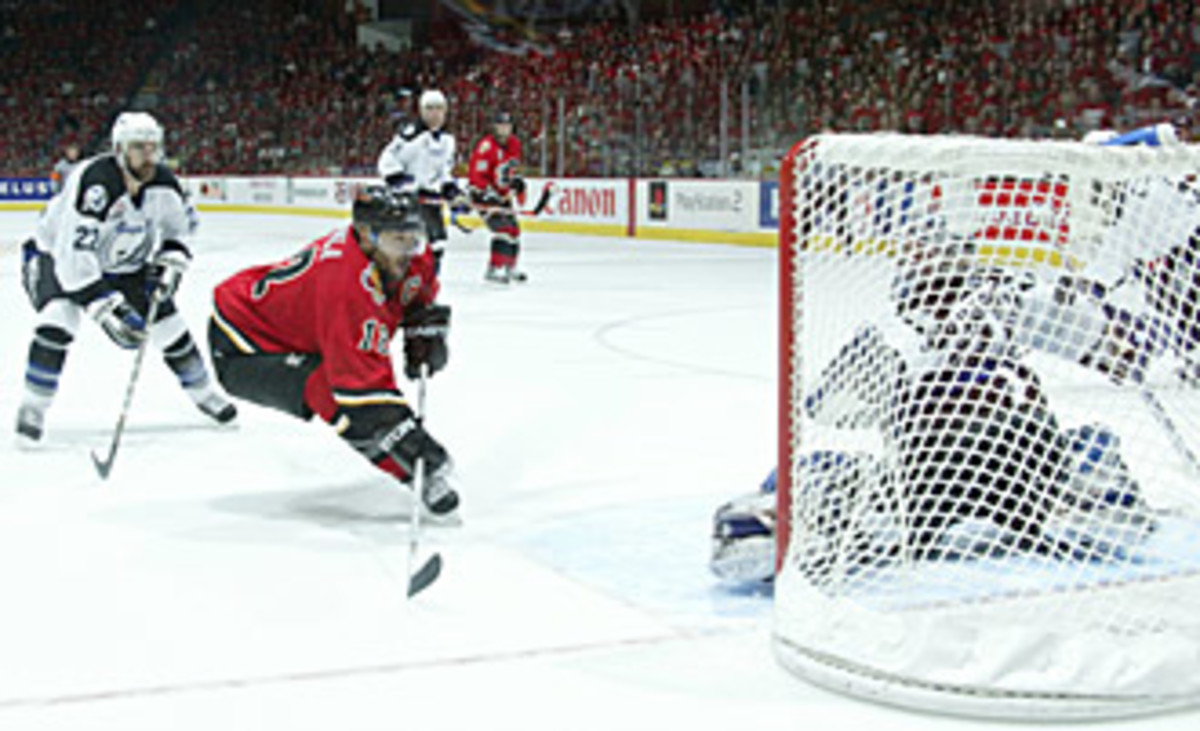
While Richards was creating an identity, Iginla, even in losing, was forging a legend. Iginla dominated Game 5 with a blend of grit and grace that has become his calling card and that isreminiscent of a young Mark Messier. Late in the second period Iginla put Calgary ahead 2–1 when he outraced Lightning defenseman Darryl Sydoto a loose puck in the offensive zone and sent an impossible-angle shot over Khabibulin’s right pad, just inside the post. Iginla played a stunning 31 minutes in the game, including more than seven as he barreled around in an overtime performance for the ages. His final shift, which lasted either exactly a minute (if you believe the Flames staff’s stopwatch) or closer to twice that (if you believe the retellings in the Calgary dressing room and the city’s papers), was an ode to rollicking old-time hockey: Iginla roaring end to end and corner to corner, losing his helmet in a collision behind the Tampa Baynet, then launching a blistering slap shot into traffic in front of Khabibulin. Saprykin banged in the rebound, but afterward Iginla was the talk of both dressing rooms.
“Jarome was an animal out there,” marveled Conroy, who called the tour de ice the greatest shift he’d ever seen.
Iginla wasn’t nearly such a factor in Games 6 and 7, when he was hounded relentlessly by Tampa’s Sydor and Pavel Kubina, who combined to hold him without a point. At times Iginla looked fatigued. Tampa Bay was wearing down as well—“Our tanks are pretty empty,” defenseman Dan Boyle said after the Game 6 marathon—but on a muggy Monday night the Lightning players were energized by their suddenly hockey-mad fans. They have the summer to rest. And to help Stanley work on his tan.
